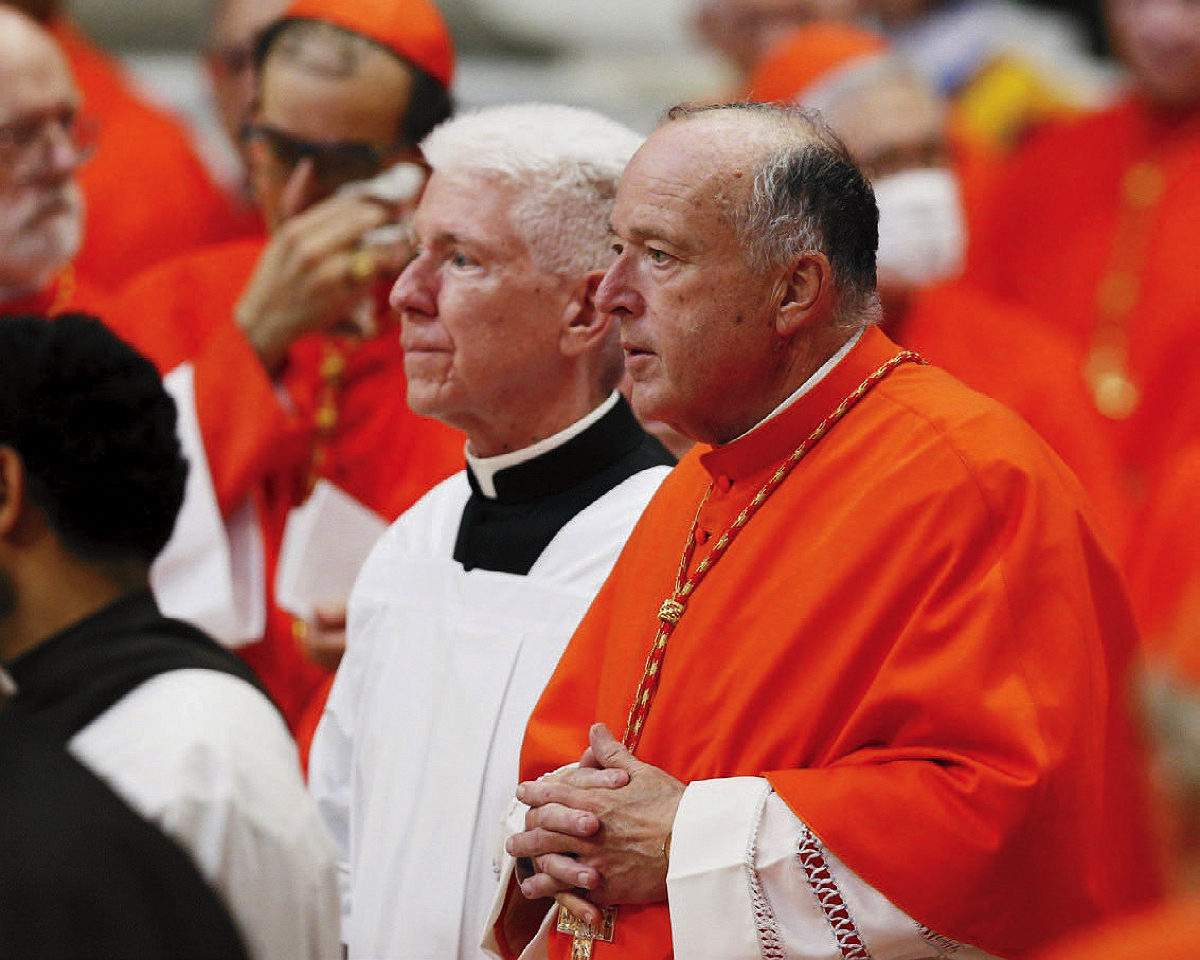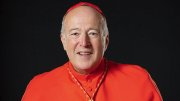Like many Americans during this fractious election year, Cardinal Robert W. McElroy ’76 has been focused on politics and the state of the country. “We can idealize, as if times in the past were all graced with tremendous solidarity,” he says. “But I think we are in a profound moment of crisis on that question in our society. Individualism is corrosive from both ends of the political and ideological spectrum. And we have to really recover a sense of common identity, common purpose and mission on certain fundamental levels.”
A lifelong Catholic and a close collaborator of Pope Francis since 2022, McElroy’s approach to ministering is based in the more practical pastoral theology than a strict rule-bound Catholicism. It’s also been shaped by studying American history at Harvard, earning doctoral degrees in moral theology and political science, and experiences as a young priest in San Francisco during the AIDS epidemic. All have been integral to his longstanding push for greater social inclusion, in society and within the Church. Solidarity, he says, is “the principle that all of us are beneficiaries of the society to which we belong, and everyone has an obligation to all the members.”
That cohesion informed his childhood. He grew up with four siblings in San Mateo County (south of San Francisco) in a neighborhood that revolved around the thriving local parish. McElroy recognized his calling as a boy and studied at a high school seminary. Ordained in 1980, he was soon ministering in San Francisco and ultimately spent 15 rewarding years as the pastor at St. Gregory Church in San Mateo. He had always hoped to spend his life in parish ministry “because it is so directly rooted in the hearts and souls of real people,” he says. But Church leaders, valuing his intellect, tapped him for larger roles, and when he was appointed auxiliary bishop in 2010, he knew the rest of his life in the Church “would be rooted in pastoral service to my diocese and in contributing to the global dialogue about the Church’s future, both in its internal life and its outreach to the world.” In 2015 Pope Francis appointed him bishop of San Diego—where he oversees 96 parishes and a community of 1.4 million Catholics—and then appointed him to the College of Cardinals.

That has meant continuing the duties of bishop but also spending more time in Rome and supporting the pope’s vision, especially his global Synod on Synodality, a multi-year process of reform that began in 2022. This “listening and dialogue” via meetings, following the Second Vatican Council’s proposed “renewal,” brings Catholics together to discern unified paths forward. McElroy, always a broad thinker, is integral to the pope’s efforts to effect changes in the Church—among them, more “accompaniment and support for” the LGBTQ+ community, lay leaders, and the role of women—that have been welcomed by many, but also vociferously opposed by other Church leaders, both in Rome and in the United States.
It is an extraordinary and pivotal time for the Church. Most Catholics “admire and cherish” Pope Francis, McElroy says: They agree with his focus on pastoral theology, “his notion that the Church is a field hospital bringing healing to souls, all in need of grace and support from one another, not condemnation.” Nevertheless, on issues like climate change, economic justice, poverty, LGBTQ+ rights, and war and peace, “The ideological polarization that cripples our society at this moment shapes divergent responses to the pope’s teachings,” he adds. “Many bishops who oppose the direction in which Pope Francis is leading the Church worry that his pastoral approach undermines the dedication to truth that is part of Catholic faith. Francis tells us that for the Christian, truth is not an idea, but a person—Jesus Christ—who calls us to conversion in love and mercy.”
The same political tribalism that’s “sapping our
energy as a people and endangering our democracy…has entered destructively into the life of the Church.”
McElroy influences the reform process in person, but also through articles and speeches. America Magazine (led by the Jesuits) published an article headlined “Cardinal McElroy on ‘Radical Inclusion’ for L.G.T.B. People, Women, and Others, in the Catholic Church,” in which he addresses feedback from the synodal dialogues. He asserted that the same political tribalism that “is sapping our energy as a people and endangering our democracy…has entered destructively into the life of the Church.” The need to reform “our own structures of exclusion,” he concludes, “will require a long pilgrimage of sustained prayer, reflection, dialogue, and action—all of which should begin now.”
Just as crucial, however, he says, are the continuing issues of abortion and climate change, especially in this election year. He’s deeply concerned about forces threatening the fate of “democratic institutions, the Constitution, and the role of law. Catholic teaching has a particular perspective that those institutions are important.” The global escalation of violence—he has consistently called for a cease-fire in Gaza—is disturbing “not just for us as a country, but for so many people who get victimized by war,” he notes. “And our participation in it is such an important moral question.” He laments that conflict is so easily sown, and that civil conversation and disagreement, nearly impossible across partisan and ideological lines, impedes functional progress. Social media, despite their advantages, share considerable blame for that: “We move more and more into our own feedback loops, those we are comfortable with, and we think ‘Oh yeah, everyone agrees with me.’ It’s a huge problem.”
Seeking exposure to fresh and diverse perspectives led McElroy to choose a college outside of the Church—specifically, Harvard and its renowned history department. In 1972, never having traveled east of Nevada, he formed a close circle of friends (two of whom traveled to Rome to watch him become a member of the College of Cardinals), concentrated in American history, and graduated in three years.
Especially formative was “Themes in Comparative World Social History” taught by Loeb University Professor Oscar Handlin, the pioneering historian of American immigration. McElroy says that only four students took the year-long seminar because Handlin required them to read four books a week (no trouble for McElroy, who had taken a speed-reading course). “The other students could also do it and were really bright and interesting,” he says. “Their perspectives on everything were just enlightening to me. And Handlin? He had an encyclopedic knowledge of everything.” When McElroy had to write a paper on comparing nineteenth-century miscegenation laws in Brazil and Virginia, Handlin recommended three or four books, “just off the top of his head,” he recalls, “and they were the best books on the topic. And he did that with everyone in the class.” The depth and intensity of learning were thrilling, and spawned not only McElroy’s enduring interest in immigration but his continuing prioritizing of the Church’s role in aiding migrants and refugees.
Aside from classes, two shows of solidarity on campus also stand out. First: the legal drinking age was lowered to 18, which led “to the largest block party all over the place,” McElroy says, laughing. The second, more sobering, was the agreement that ostensibly ended American participation in the Vietnam War. “That was a moment of great thanksgiving and gratitude from the whole community because we had been facing the reality of the draft, for one thing, and the tragedy of the war for so many people as a whole. The University came together and there was a sense of unity.”
McElroy went on to earn a master’s degree in American history from Stanford, then a master’s in divinity from St. Patrick’s Seminary in 1979 before he was ordained. Among his other degrees are two doctorates (in political science from Stanford and in moral theology from the Gregorian University in Rome), both of which yielded books: The Search for an American Public Theology: The Contribution of John Courtney Murray (1989) and Morality and American Foreign Policy: The Role of Ethics in International Affairs (1992).
Academic work has always fed his mind—and his spirit. “Harvard honed my ability to write with greater clarity and elegance,” he says, and “the level of passion and self-assurance (sometimes justified and sometimes not) in the debates on myriad subjects that we had in the classroom, the dining hall at Mather House, or at parties taught me a great deal about speaking and listening and genuinely learning amidst all the bravado.” The combined experiences of Harvard, Stanford, and the seminary “introduced me to a wide diversity of human experiences, cultures, and social environments. Hopefully, this created in me a greater empathy, a willingness to listen, and an understanding that my own experience was just a small microcosm of the human reality in our world.”
That certainly came to bear while serving as a young priest in the 1980s at Saint Cecilia Church in San Francisco, where he was also secretary (and later vicar general) to Archbishop John R. Quinn, a leader in the Church’s stands on war and peace, poverty, and racial justice. As early as 1983, Quinn reached out to gay Catholics and supported a Castro neighborhood parish that held vigils for HIV-positive parishioners and their caregivers. McElroy co-wrote a diocesan report stating that homosexuality is not held to be a sinful condition and that homosexuals should be helped to follow the principle of “gradualism”: “the notion that Jesus called men and women as they were in real lives and recognized that their call to enflesh the gospel was a lifelong project,” he explains now. He also remembers visiting parishioners—“young people dying of this terrible and unknown disease. And very often their families refused to embrace them in their illness. I think it was then that I began to seek ways to show that LGBTQ+ persons are truly, equally members of the Catholic Church and that all dimensions and attitudes of exclusion should end.”
Throughout his cherished years as a parish pastor—the role he originally sought as a boy with a calling—he was moved and nurtured by “the way in which people allowed you into their lives to walk their journey with them.” Back then, he was sometimes asked if he ever got tired of listening to people’s problems. The answer was, and is, no. “It was inspiring…and you saw how difficult it was but how heroically so many people strive to live as they should.” To be let into others’ anguish is a privilege, he agrees, “and priests must be careful in presenting the image of God in a way that’s proper, too. The God who embraces us, who loves, is not diminished by our failures.”









